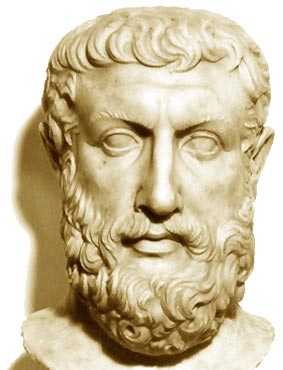“It is indifferent to me where I am to begin, for there shall I return again.”
Frag. B 5, quoted by Proclus, Commentary on the Parmenides, 708
Parménide d'Élée est un philosophe grec présocratique, pythagoricien, puis éléate, né à Élée à la fin du VIe siècle av. J.-C. et mort au milieu du Ve siècle av. J.-C.. Il est célèbre pour un poème en vers, De la nature, qui eut une influence notable sur la pensée de son époque. Ses découvertes intellectuelles, en particulier l'introduction de la logique dans la pensée hellénique, à côté de la philosophie milésienne de la nature et des théories arithmétiques de Pythagore, font de Parménide l'un des philosophes les plus considérables dans l'histoire de la philosophie grecque. Platon a consacré un dialogue qui porte son nom, le Parménide, pour traiter la question de l'Être, dont Parménide a inlassablement répété qu'il est, tandis que le Non-Être n'est pas. Wikipedia

“It is indifferent to me where I am to begin, for there shall I return again.”
Frag. B 5, quoted by Proclus, Commentary on the Parmenides, 708
Frag. B 2.2-6, quoted by Proclus, Commentary on the Timaeus I, 345
Frag B 1.28-30, quoted by Sextus Empiricus, Against the Mathematicians, vii. 3; Simplicius, Commentary on the Heavens, 557-8; Proclus, Commentary on the Timaeus I, 345
Frag. B 8.1-4, quoted by Simplicius, Commentary on the Physics, 144
Frag. B 7.1-2, quoted by Plato, Sophist, 237a
Frag. B 7.3-8.1, quoted by Sextus Empiricus, Against the Mathematicians, vii. 3
“For it is the same thing that can be thought and that can be.”
Frag. B 3, quoted by Plotinus, Enneads V, i.8